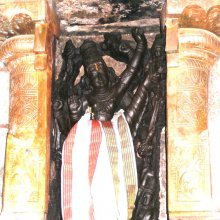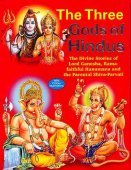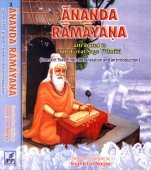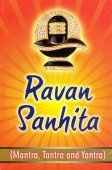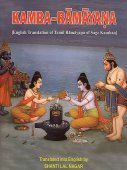Yajna, Yajña: 27 definitions
Introduction:
Yajna means something in Buddhism, Pali, Hinduism, Sanskrit, Marathi, Hindi. If you want to know the exact meaning, history, etymology or English translation of this term then check out the descriptions on this page. Add your comment or reference to a book if you want to contribute to this summary article.
Images (photo gallery)
In Hinduism
Shaktism (Shakta philosophy)
Source: Red Zambala: The 10 Great Wisdom GoddessesThe cosmic sacrifice (yajña) expresses this process of universal metabolism, and the ritual sacrifices (yajñas) are performed with the intention of harmonising and co-operating with the cosmic process. Yajña is the exchanging of energies between differing levels. The aspect of Śiva which presides over the cosmic sacrifice is the Headless (Kabandha).

Shakta (शाक्त, śākta) or Shaktism (śāktism) represents a tradition of Hinduism where the Goddess (Devi) is revered and worshipped. Shakta literature includes a range of scriptures, including various Agamas and Tantras, although its roots may be traced back to the Vedas.
Purana and Itihasa (epic history)
Source: archive.org: Puranic EncyclopediaYajña (यज्ञ).—An incarnation of Mahāviṣṇu. Svāyambhuva Manu had two sons, Priyavrata and Uttānapāda and three daughters, Ākūti, Devahūti and Prasūti. Ruci Prajāpati married Ākūti. Yajña was their son. Devī Bhāgavata, 8th Skandha mentions that this Yajña was an incarnation of Ādi Nārāyaṇa.
Yajña had a sister named Dakṣiṇā. They were twins. They married each other. The twelve sons who were born to them were the Devas known as Yāmas, during the Svāyambhuva Manvantara. (Viṣṇu Purāṇa, Part 1, Chapter 7).
Yajña’s twelve sons were:—Toṣa, Pratoṣa, Santoṣa, Bhadra, Śānti, Iḍaspati, Iddhma, Kavi, Vibhu, Sraghna, Sudeva and Virocaka. Their father Yajña was the Indra of Svāyambhuva Manvantara. (Bhāgavata, 4th Skandha).
Source: archive.org: Shiva Purana - English TranslationYajña (यज्ञ) refers to the “sacrifice” (e.g. in its embodied form), as mentioned in the Śivapurāṇa 2.2.27. Accordingly as Brahmā narrated to Nārada:—“[...] once a great sacrifice was started by Dakṣa, [...] In that altar, sacrifice (yajña) itself was present in its beautiful embodied form. The excellent sages became the holders of the Vedas. The sacrificial fire evinced its diverse forms in a thousand ways, during the sacrificial festivities, in order to receive the sacrificial offerings of Dakṣa”.
Source: Cologne Digital Sanskrit Dictionaries: The Purana Index1a) Yajña (यज्ञ).—The seventh avatār of Viṣṇu; born with Dakṣiṇā as twins to Akūtī and Ruci. Adopted as his son by his grandfather Svāyambhuva Manu.1 Followed by the Yāma gods, slew the Asuras and Yātudhānas who attacked and sought to devour Svāyambhuva Manu engaged in contemplation of Hari, and ruled the celestial kingdom;2 worshipped for attaining celebrity;3 to Yajña and Dakṣiṇā were born twelve sons who were known as Yāmas in the period of Svāyambhuva; Yajña also Yāma;4 constitutes dharma and mantra; the Yajva goes to heaven;5 a soma yajus of paśu, dravya, havis, ṛtviks, dakṣiṇa.6
- 1) Bhāgavata-purāṇa I. 3. 12; III. 19. 13; IV. 1. 4-5; VI. 8. 15; VIII. 1. 6.
- 2) Ib. VIII. 1. 17-18; X. 6. 22.
- 3) Ib. II. 3. 7; Brahmāṇḍa-purāṇa II. 34. 7.
- 4) Vāyu-purāṇa 10. 19-20; Brahmāṇḍa-purāṇa II. 9. 44ff.
- 5) Vāyu-purāṇa 32. 16.
- 6) Ib. 57. 107; 59. 42.
1b) A Jayādeva.*
- * Brahmāṇḍa-purāṇa III. 3. 7; 4. 3; Vāyu-purāṇa 66. 7.
1c) Origin of, in Treta and dispute on its nature, whether hiṃsā or not;1 trees fit for; samāna, plakṣa, nyagrodha, aśvattha, udumbara, vikarika, bilva, candaṇa, sarala, devadāru, śāla, khadira; unfit are: śleṣmātaka, naktamāla, kapittha, śālmali, nīpa, vibhītaka and those which are enveloped by creepers and are the residence of birds;2 of Śūdras by Brahmanas for livelihood (vṛtti);3 performance of, pleases the gods who give rain;4 personified as God with wife Dakṣiṇā and twelve sons, generally known as Yāmas;5 born of Viṣṇu and Ākūtī in the Svāyambhuva epoch; of Tuṣitā in Svārociṣa, of Satyā in Uttama, of Havya in Tāmasa and Sambhūti in Raivata;6 duty of all.7
- 1) Vāyu-purāṇa 57. 86-125.
- 2) Ib. 75. 71-76.
- 3) Ib. 99. 426; 101. 296; 112. 1 and 14.
- 4) Viṣṇu-purāṇa I. 6. 8.
- 5) Ib. I. 7. 21.
- 6) Ib. III. 1. 36-40.
- 7) Ib. III. 8. 22
1d) (Japa) for Brahmanas;1 introduced by Indra in Tretāyuga; questioned by the sages as to hiṃsā of animals. Vasu, son of Uttānapāda who was appointed arbitrator said that yajña pleases the gods and tapas, Vairāja leading to Kaivalya. Not favoured in Kaliyuga;2 prohibited by Vena, but reintroduced by Vainya in the Vaivasvata epoch;3 Sruca clan of apsaras born of;4 the five to be done by householders daily, chanting of the Vedas, homas, śrāddha for pitṛs, gifts of rice, etc. to bhūtas and balikarma;5 performed by the Asuras.6
- 1) Brahmāṇḍa-purāṇa II. 29. 55.
- 2) Ib. II. 30. 4-42; 31. 64; 32. 47; 34. 6; Matsya-purāṇa Ch. 143 (whole).
- 3) Brahmāṇḍa-purāṇa II. 36. 130; III. 72. 2; 73. 72; IV. 6. 55, 73.
- 4) Brahmāṇḍa-purāṇa III. 4. 24; 7. 22.
- 5) Matsya-purāṇa 10. 34; 52. 14-15.
- 6) Ib. 83. 3, 8; 130. 19.
1e) The son of Brahmadhana.*
- * Vāyu-purāṇa 67. 28; 69. 132.

The Purana (पुराण, purāṇas) refers to Sanskrit literature preserving ancient India’s vast cultural history, including historical legends, religious ceremonies, various arts and sciences. The eighteen mahapuranas total over 400,000 shlokas (metrical couplets) and date to at least several centuries BCE.
Pancaratra (worship of Nārāyaṇa)
Source: Wisdom Library: PāñcarātraYajña (यज्ञ) refers to an aspect of nṛsiṃha (‘man-lion’), according to the Vihagendra-saṃhitā 4.17, which mentions seventy-four forms (inlcuding twenty forms of vyūha). He is also known as Yajñanṛsiṃha or Yajñanarasiṃha. Nṛsiṃha is a Tantric deity and refers to the furious (ugra) incarnation of Viṣṇu.
The 15th-century Vihagendra-saṃhīta is a canonical text of the Pāñcarātra corpus and, in twenty-four chapters, deals primarely with meditation on mantras and sacrificial oblations.

Pancaratra (पाञ्चरात्र, pāñcarātra) represents a tradition of Hinduism where Narayana is revered and worshipped. Closeley related to Vaishnavism, the Pancaratra literature includes various Agamas and tantras incorporating many Vaishnava philosophies.
Dharmashastra (religious law)
Source: Sacred Texts: The Grihya Sutras, Part 2 (SBE30)Yajña (यज्ञ, “sacrifice”) is defined in the Āpastamba-yajña-paribhāṣā-sūtras 1.—“yajña, sacrifice, is an act by which we surrender something for the sake of the gods. Such an act must rest on a sacred authority (āgama), and serve for man’s salvation (śreyortha). The nature of the gift is of less importance. It may be puroḍāśa, cake; karu, pulse; sāṃnāyya, mixed milk; paśu, an animal; soma, the juice of the Soma-plant, &c.; nay, the smallest offerings of butter, flour, and milk may serve for the purpose of a sacrifice”.
Note: Yajña, Yāga, Yajana, and Iṣṭi are considered as synonyms.

Dharmashastra (धर्मशास्त्र, dharmaśāstra) contains the instructions (shastra) regarding religious conduct of livelihood (dharma), ceremonies, jurisprudence (study of law) and more. It is categorized as smriti, an important and authoritative selection of books dealing with the Hindu lifestyle.
Vaishnavism (Vaishava dharma)
Source: Pure Bhakti: Bhagavad-gita (4th edition)Yajña (यज्ञ) refers to “(1) Sacrifice in which a deity is propitiated by the chanting of prayers and mantras and the offering of ghee into the sacred fire (2) Any kind of intense endeavour that is directed at achieving a particular goal”. (cf. Glossary page from Śrīmad-Bhagavad-Gītā).
Source: Pure Bhakti: Bhajana-rahasya - 2nd EditionYajña (यज्ञ) refers to:—(1) a sacrifice in which a deity is propitiated by the chanting of prayers and mantras and the offering of ghee into the sacrificial fire; (2) any kind of intense endeavour which is directed at achieving a particular goal. (cf. Glossary page from Bhajana-Rahasya).
Source: Pure Bhakti: Arcana-dipika - 3rd EditionYajña (यज्ञ) refers to:—A sacrifice in which lord Viṣṇu is propitiated by the chanting of prayers, mantras and the offering of ghee into the sacrificial fire. (cf. Glossary page from Arcana-dīpikā).

Vaishnava (वैष्णव, vaiṣṇava) or vaishnavism (vaiṣṇavism) represents a tradition of Hinduism worshipping Vishnu as the supreme Lord. Similar to the Shaktism and Shaivism traditions, Vaishnavism also developed as an individual movement, famous for its exposition of the dashavatara (‘ten avatars of Vishnu’).
Jyotisha (astronomy and astrology)
Source: Wisdom Library: Brihat Samhita by VarahamihiraYajña (यज्ञ) or Iṣṭi refers to “sacrificial rites”, according to the Bṛhatsaṃhitā (chapter 15) (“On the nakṣatras—‘asterisms’”), an encyclopedic Sanskrit work written by Varāhamihira mainly focusing on the science of ancient Indian astronomy astronomy (Jyotiṣa).—Accordingly, “Those who are born on the lunar day of Puṣya will be dealers in barley, wheat, rice, sugar-canes and in the produce of the forest; will be either ministers or rulers; will live by water; will be Sādhus and will delight in sacrificial rites (yajña-iṣṭi-sakta). Those who are born on the lunar day of Āśleṣā, will be dealers in perfumes, roots, fruits, reptiles, serpents and poison; will delight in cheating others of their property; will be dealers in pod grains and will be skilled in medicine of every sort. [...]”.

Jyotisha (ज्योतिष, jyotiṣa or jyotish) refers to ‘astronomy’ or “Vedic astrology” and represents the fifth of the six Vedangas (additional sciences to be studied along with the Vedas). Jyotisha concerns itself with the study and prediction of the movements of celestial bodies, in order to calculate the auspicious time for rituals and ceremonies.
General definition (in Hinduism)
Source: Hindupedia: The Hindu EncyclopediaYajña is the central concept of Śrauta -- the tradition that follows from the Śruti (Veda).
There are many concepts that are based on and evolved from the concept of yajña. The word yajña comes from the root-"yaj" which means to worship. Yajña is a broad concept which is hard to translate into English. The closest single English word for yajña is sacrifice. There are multiple synonyms of the word yajña that convey different aspects of this broad concept. For instance it is also called “karma”, meaning action or the act of sacrifice/offering/worshiping. In the general sense it can be understood as any action done with the sense of sacrifice, like praying, remembering, meditating. In the specific sense it is the act of offering oblations to propitiate a Devata.
The primary constituents of a Yajña are the
- inspiration or urge of the doer (bhāvana),
- learning (svādhyāya),
- rites involved (karma),
- offerings (tyāga),
-
devata
- and the results (phala).
In Hinduism,yajña is a ritual of offerings accompanied by chanting of Vedic mantras (also "worship, prayer, praise, offering and oblation, sacrifice" according to Monier-Williams) derived from the practice in Vedic times. Yajna is an ancient ritual of offering and sublimating the havana sámagri (herbal preparations) in the fire. The sublime meaning of the word yajna is derived from the Sanskrit verb yaj, which has a three-fold meaning of worship of deities (devapujana), unity (sangatikarana) and charity (dána). An essential element is the ritual fire – the divine Agni – into which oblations are poured, as everything that is offered into the fire is believed to reach God.
Rituals associated with temple worship in Hinduism are called agamic, while those involving communication with divinity through Agni are considered to be Vedic. Temple rites in modern-day Hinduism are a combination of both Vedic and agamic rituals. The ritualistic portion of the Hindu scriptures is called Karma-Kanda. Parts of Vedas which describe or discuss Yajnas fall into this portion.
etymology: yajña (Sanskrit: यज्ञ; IAST: yajña, also transliterated yagya, yaga or yadnya) or yagam (Tamil: யாகம்)
In Buddhism
Mahayana (major branch of Buddhism)
Source: academia.edu: A Study and Translation of the GaganagañjaparipṛcchāYajña (यज्ञ) refers to “offerings”, according to the Gaganagañjaparipṛcchā: the eighth chapter of the Mahāsaṃnipāta (a collection of Mahāyāna Buddhist Sūtras).—Accordingly, “[...] Son of good family, when the Bodhisattva is unbreakable (abhedya) having made a resolve as firm as a diamond with the twelve qualities, he is not disturbed by the world with its gods. What are those twelve? [...] (9) endless offerings (atyanta-yajña) for the sake of obtaining the characteristics of a great man and the marks of beauty are unbreakable; (10) giving up body and life in order to uphold the true religion is unbreakable; (11) dedicating his roots of good for the sake of other beings is unbreakable; (l2) his accumulation of all qualities of the Buddha is unbreakable.[...]”.

Mahayana (महायान, mahāyāna) is a major branch of Buddhism focusing on the path of a Bodhisattva (spiritual aspirants/ enlightened beings). Extant literature is vast and primarely composed in the Sanskrit language. There are many sūtras of which some of the earliest are the various Prajñāpāramitā sūtras.
Languages of India and abroad
Marathi-English dictionary
Source: DDSA: The Molesworth Marathi and English Dictionaryyajña (यज्ञ).—m (S) Sacrificing; a sacrifice: also an offering of whatever subject (bloody or bloodless). 2 An oblation, observance or act in general for the propitiation of a deity.
Source: DDSA: The Aryabhusan school dictionary, Marathi-Englishyajña (यज्ञ).—m A sacrifice; sacrificing. An oblation.
Marathi is an Indo-European language having over 70 million native speakers people in (predominantly) Maharashtra India. Marathi, like many other Indo-Aryan languages, evolved from early forms of Prakrit, which itself is a subset of Sanskrit, one of the most ancient languages of the world.
Sanskrit dictionary
Source: DDSA: The practical Sanskrit-English dictionaryYajña (यज्ञ).—[yaj-bhāve na]
1) A sacrifice, sacrificial rite; any offering or oblation; यज्ञेन यज्ञमयजन्त देवाः (yajñena yajñamayajanta devāḥ); तस्माद्यज्ञात् सर्वहुतः (tasmādyajñāt sarvahutaḥ) &c.; यज्ञाद् भवति पर्जन्यो यज्ञः कर्मसमुद्भवः (yajñād bhavati parjanyo yajñaḥ karmasamudbhavaḥ) Bhagavadgītā (Bombay) 3.14.
2) An act of worship, any pious or devotional act. (Every householder, but particularly a Brāhmaṇa, has to perform five such devotional acts every day; their names are :-bhūtayajña, manuṣyayajña, pitṛyajña, devayajña, and brahmayajña, which are collectively called the five 'great sacrifices'; see mahāyajña, and the five words separately.)
3) Name of Agni.
4) Of Viṣṇu; ऋषयो यैः पराभाव्य यज्ञघ्नान् यज्ञमीजिरे (ṛṣayo yaiḥ parābhāvya yajñaghnān yajñamījire) Bhāgavata 3.22.3.
Derivable forms: yajñaḥ (यज्ञः).
Source: Cologne Digital Sanskrit Dictionaries: Edgerton Buddhist Hybrid Sanskrit DictionaryYajña (यज्ञ).—nt. (otherwise m.), sacrifice: mahāyajñāni yajamāno Mahāvastu ii.405.10 (verse, but so far from being m.c., the added syllable spoils the meter; first half of anuṣṭubh; no v.l.).
Source: Cologne Digital Sanskrit Dictionaries: Shabda-Sagara Sanskrit-English DictionaryYajña (यज्ञ).—m.
(-jñaḥ) A sacrifice, a ceremony in which oblations are presented. E. yaj to worship, aff. naṅ .
--- OR ---
Yājñā (याज्ञा).—f.
(-jñā) Asking, begging. E. yāc to ask, naṅ aff.
Source: Cologne Digital Sanskrit Dictionaries: Benfey Sanskrit-English DictionaryYajña (यज्ञ).—i. e. yaj + na, m. A sacrifice, [Mānavadharmaśāstra] 1, 22; 23.
Source: Cologne Digital Sanskrit Dictionaries: Cappeller Sanskrit-English DictionaryYajña (यज्ञ).—[masculine] worship, devotion, homage, praise, prayer; sacrifice, oblation.
--- OR ---
Yājña (याज्ञ).—[adjective] relating to sacrifice.
Source: Cologne Digital Sanskrit Dictionaries: Aufrecht Catalogus CatalogorumYajña (यज्ञ) as mentioned in Aufrecht’s Catalogus Catalogorum:—(?): Dhruvabhramaṇayantra.
Source: Cologne Digital Sanskrit Dictionaries: Monier-Williams Sanskrit-English Dictionary1) Yajña (यज्ञ):—[from yaj] m. worship, devotion, prayer, praise
2) [v.s. ...] act of worship or devotion, offering, oblation, sacrifice (the former meanings prevailing in Veda, the latter in post-Vedic literature; cf. mahā-y), [Ṛg-veda] etc. etc.
3) [v.s. ...] a worshipper, sacrificer, [Ṛg-veda iii, 30, 15; 32, 12]
4) [v.s. ...] fire, [cf. Lexicographers, esp. such as amarasiṃha, halāyudha, hemacandra, etc.]
5) [v.s. ...] = ātman, [cf. Lexicographers, esp. such as amarasiṃha, halāyudha, hemacandra, etc.]
6) [v.s. ...] Sacrifice personified, [Mahābhārata; Harivaṃśa]
7) [v.s. ...] (with prājāpatya) Name of the reputed author of [Ṛg-veda x, i 30; Anukramaṇikā]
8) [v.s. ...] Name of a form of Viṣṇu, [Purāṇa]
9) [v.s. ...] of Indra under Manu Svāyambhuva, [ib.]
10) [v.s. ...] of a son of Ruci and Ākūti, [ib.]
11) Yājña (याज्ञ):—[from yāj] a mfn. ([from] yajñā, of which it is also the Vṛddhi form in [compound]) relating or belonging to sacrifice, [Nirukta, by Yāska]
12) b yājñika, yājya See above.
Source: Cologne Digital Sanskrit Dictionaries: Yates Sanskrit-English DictionaryYajña (यज्ञ):—(jñaḥ) 1. m. Sacrifice; Vishnu.
[Sanskrit to German]
Sanskrit, also spelled संस्कृतम् (saṃskṛtam), is an ancient language of India commonly seen as the grandmother of the Indo-European language family (even English!). Closely allied with Prakrit and Pali, Sanskrit is more exhaustive in both grammar and terms and has the most extensive collection of literature in the world, greatly surpassing its sister-languages Greek and Latin.
Hindi dictionary
Source: DDSA: A practical Hindi-English dictionaryYajña (यज्ञ) [Also spelled yagya]:—(nm) sacrifice, an ancient Hindu institution of religious sacrifice and oblation; -[kuṃḍa] fire pit for performance of a [yajña; -kriyā] the process of performing a [yajña; -dakṣiṇā] the gratification—in cash or kind—for the priest who performs a '[yajña; -paśu] the animal to be sacrificed in a '[yajña'; -bhūmi] the place of performance of a '[yajña'; -maṃḍapa] the pavilion wherein a [yajña] is performed; -[vedikā/vedī] the altar on which a '[yajña]' is performed; ~[śālā] the enclosure within which a '[yajña]' is performed; ~[sūtra] see [yajñopavīta; -sthāṇu] the pillar with which the '[yajña; -paśu]' is tethered.
...
Kannada-English dictionary
Source: Alar: Kannada-English corpusYajña (ಯಜ್ಞ):—
1) [noun] an elaborate religious sacrifice.
2) [noun] a religious service; a worshipping.
3) [noun] a difficult, onerous task;ಯಜ್ಞ ಮಾಡು [yajna madu] yajña māḍu to perform a religious sacrifice.
4) [noun] to sacrifice an animal; to kill; to slaughter.
5) [noun] to beat heavily and repeatedly; to thrash.
--- OR ---
Yājña (ಯಾಜ್ಞ):—[adjective] relating to a religious sacrifice or sacrifices; sacrificial.
Kannada is a Dravidian language (as opposed to the Indo-European language family) mainly spoken in the southwestern region of India.
See also (Relevant definitions)
Starts with (+329): Yajna Dikshita, Yajnabahishkrita, Yajnabahu, Yajnabahya, Yajnabandhu, Yajnabhadra, Yajnabhaga, Yajnabhagabhuj, Yajnabhageshvara, Yajnabhairava, Yajnabhajana, Yajnabhanda, Yajnabhanga, Yajnabhartri, Yajnabhavana, Yajnabhavita, Yajnabhoktar, Yajnabhoktri, Yajnabhrit, Yajnabhrita.
Ends with (+166): Abhicarayajna, Abhicharayajna, Abhiyajna, Adhiyajna, Adyayajna, Agniyajna, Ahridayajna, Amritayajna, Anadudyajna, Anantashaktyajna, Anarthayajna, Angayajna, Anishtayajna, Anukulayajna, Anvayajna, Anyayajna, Apancayajna, Arambhayajna, Arthavyayajna, Ashvamedhayajna.
Full-text (+1296): Yajnavaraha, Adhiyajna, Nriyajna, Pitriyajna, Yajnasara, Yajnadatti, Yajnari, Manushyayajna, Brahmayajna, Bhutayajna, Yajnapurusha, Pakayajna, Yajnasena, Yajnapashu, Yajnasutra, Yajnadattaka, Jayayajna, Yajnapata, Yajnadeva, Yajnavalka.
Relevant text
Search found 157 books and stories containing Yajna, Yajña, Yājñā, Yājña; (plurals include: Yajnas, Yajñas, Yājñās, Yājñas). You can also click to the full overview containing English textual excerpts. Below are direct links for the most relevant articles:
Garga Samhita (English) (by Danavir Goswami)
Verse 6.15.1 < [Chapter 15 - The Glories of Nṛga-kūpa and Gopī-bhūmi]
Verse 5.2.19 < [Chapter 2 - The Killing of Keśī]
Verses 3.10.26-27 < [Chapter 10 - The Glory of Śrī Girirāja]
Shrimad Bhagavad-gita (by Narayana Gosvami)
Verse 4.25 < [Chapter 4 - Jñāna-Yoga (Yoga through Transcendental Knowledge)]
Verse 4.33 < [Chapter 4 - Jñāna-Yoga (Yoga through Transcendental Knowledge)]
Verse 3.12 < [Chapter 3 - Karma-yoga (Yoga through the Path of Action)]
Atithi or Guest Reception (study) (by Sarika. P.)
Part 1 - The concept of Yajña (sacrifice) < [Chapter 7 - Pañcamahāyajñas]
Part 2 - Madhuparka offering < [Chapter 8 - Madhuparka]
Part 3 - Content analysis of Dharmasūtras < [Chapter 5 - The Dharmaśāstra Literature]
Rig Veda (translation and commentary) (by H. H. Wilson)
Brihad Bhagavatamrita (commentary) (by Śrī Śrīmad Bhaktivedānta Nārāyana Gosvāmī Mahārāja)
Verse 1.2.39-40 < [Chapter 2 - Divya (the celestial plane)]
Verse 1.2.64 < [Chapter 2 - Divya (the celestial plane)]
Verse 1.5.73 < [Chapter 5 - Priya (the beloved devotees)]
The Agnistoma Somayaga in the Shukla Yajurveda (by Madan Haloi)
Part 1: Meaning and Significance of the word Yajña < [Chapter 2 - An Introduction to the Ritualistic Religion of the Vedas]
Part 2.1: Types of Sacrifices in General (Introduction) < [Chapter 2 - An Introduction to the Ritualistic Religion of the Vedas]
Part 3: The Adhikārins < [Chapter 2 - An Introduction to the Ritualistic Religion of the Vedas]
Related products
(+1 more products available)
